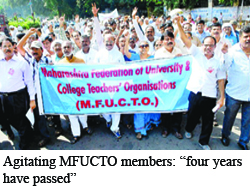Even as large swathes of india’s most industrialised state — --Maharashtra (pop. 112 million) — are suffering the worst drought in four decades and the Congress-NCP govern-ment is reeling under a spate of scandals (including a Rs.70,000 crore defalcation in the irrigation ministry), 50,000 college and university teachers across the state have struck work since February, demanding pay arrears of Rs.1,906 crore.
The strike has been called by the Maharashtra Federation of University and College Teachers’ Organisation (MFUCTO), which has been leading a statewide boycott of all academic and exam-related work by university and college teachers to press its demand for Sixth Pay Commission (SPC) pay scales arrears, and regularisation of 8,000 qualified faculty appointed between 1991 and 1998. These 8,000 university teachers have not written the National Eligibility Test and/or the State Eligibility Test, clearance of which was not mandatory at the time of their appointment.
According to mfucto, the total spc arrears due to college and varsity faculty for the period between January 1, 2006 to March 31, 2010 aggregates Rs.1,906 crore, of which 20 percent (Rs.380 crore) had to be paid by the state government after which the Central government would release the remaining Rs.1,526 crore. But although the SPC’s populist (40 percent higher) pay scales decreed for 4 million Central government employees without any conditions were promptly adopted by state governments and became effective in 2008 with retrospective effect from January 1, 2001, the bankrupt Maharashtra state govern-ment has not paid its share of Rs.380 crore to the Reserve Bank of India. Therefore even the Central govern-ment’s contribution of Rs.1,526 crore has been stalled.
“Four years have passed since the SPC pay scales were decreed, but the state government has not paid a single penny. Therefore our strike will continue until the government redeems its promise,’’ says Tapati Mukhopadhyay, general secretary of MFUCTO.
On the other hand the state govern-ment blames the Centre for holding up teachers’ arrears. “The delay is mainly because of a change of position by the Union HRD ministry regarding the mode of payment of its 80 percent share. The ministry had earlier indicated its willingness to release its full share. But on  August 14 last year, it informed us that we should first pay the entire 20 percent share of arrears to teachers, following which the Centre would pay the balance in three instalments. Both the Central government and teachers should realise that currently the state is reeling under acute drought condi-tions and it isn’t possible for us to pay out our entire 20 percent share at the moment,” says J.S. Saharia, principal secretary of higher and technical education of the Maharashtra government.
August 14 last year, it informed us that we should first pay the entire 20 percent share of arrears to teachers, following which the Centre would pay the balance in three instalments. Both the Central government and teachers should realise that currently the state is reeling under acute drought condi-tions and it isn’t possible for us to pay out our entire 20 percent share at the moment,” says J.S. Saharia, principal secretary of higher and technical education of the Maharashtra government.
The degree college teachers’ ind-efinite strike, which has now entered its 75th day, is slated to continue after a meeting on April 19 between the mini-ster of higher and technical education Rajesh Tope and a 16-member deleg-ation of the MFUCTO executive comm-ittee failed to arrive at any agreement. Though the government offered to release one of three Central instalments payable under the SPC by May 31, the teachers’ association rejected the offer.
Addressing the media after the abortive meeting with the MFUCTO executive committee, Tope asked the striking teachers not to hold the government and students to ransom. “University faculty are already drawing whopping salaries, ranging from Rs.75,000 to Rs.1.5 lakh per month for professors. After being paid arrears, each of them will be richer by Rs.48 lakh. Of this, we have offered them Rs.12 lakh by May 31. Can they really justify such a big payout when the state is reeling under a drought and the state govern-ment is running a budget deficit of Rs.1,159 crore? Teachers should be more responsible and not hold government and students to ransom,’’ said Tope warning of “stern action’’.
Inevitably the stand-off between the state government and college and university faculty has hit students the hardest. Their prime concern is that delay in announcement of examination results could mar their chances of admission into higher education institutions and hit their preparation for competitive entrance exams. Comments Neeta Joshi, a third-year commerce student of Mumbai University who plans to go abroad for higher study: “I have been preparing for competitive exams for study abroad. But if the teachers continue their strike, college exam results will be delayed, as a result of which the entire process will be delayed. The government should have discharged its promise to teachers and saved us a lot of grief.”
Not a government which is given to procrastination until an issue assumes crisis proportions.
Praveer Sinha (Mumbai)